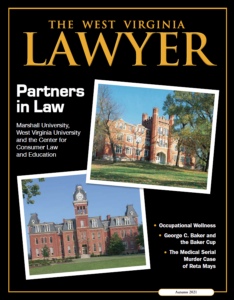Collapse All
ABOUT THE LAWYER DISCIPLINARY BOARD
The Lawyer Disciplinary Board, with the assistance of the Office of Disciplinary Counsel, has jurisdiction to investigate complaints regarding violations of the Rules of Professional Conduct; to hold hearings; and to make recommendations with respect to disciplinary action to be taken against lawyers. The Board consists of two-thirds practicing lawyers and one-third non-lawyers, all appointed by the President of the Board of Governors of The West Virginia State Bar. The Board is divided into an Investigative Panel, which reviews complaints, and a Hearing Panel, which presides over hearings and makes recommendations to the Supreme Court of Appeals of West Virginia. The Office of Disciplinary Counsel consists of four lawyers [a Chief Lawyer Disciplinary Counsel and three Lawyer Disciplinary Counsel] and four support staff. The Lawyer Disciplinary Board and the Office of Disciplinary Counsel are funded by The West Virginia State Bar from dues paid by West Virginia lawyers.
LAWYERS' RULES ARE STRICT
GENERAL CONSIDERATIONS
However, lawyers are human. Some are more competent than others. Sometimes they make mistakes. A lawyer may lose the trust and confidence of a client for various reasons. In many cases where a client becomes dissatisfied, grounds for discipline do not exist. Lawyers may be disciplined only if they have violated the Rules of Professional Conduct. Mere dissatisfaction with, or disappointment in, the results of litigation or other legal business is not grounds for disciplinary action against a lawyer.
A formal complaint of unprofessional conduct against a lawyer is a serious matter. It puts into action the disciplinary process of The Office of Disciplinary Counsel and the Supreme Court of Appeals of West Virginia The lawyer inevitably suffers from the accusation regardless of whether he or she is ultimately found to be at fault.
If you believe your complaint is well founded, by all means make it.
On the other hand, if you feel that your grievance may be the result of inadequate communications–lack of sufficient agreement or some misunderstanding—it may be that the problem can be solved by a frank talk with the lawyer. Tell him or her of your dissatisfaction, and ask for a full explanation of the matter involved. Such a discussion will often eliminate, or lead to a solution of, the problem. A lawyer who receives an ethics complaint from his or her client may attempt to withdraw from representation, if you are the lawyer’s client. It is the Board’s strong preference, therefore, that you attempt to discuss your dissatisfaction with the lawyer, face to face, before you file a complaint.
TIME LIMIT ON FILING COMPLAINTS
INFORMAL COMPLAINTS
FEE DISPUTES
The West Virginia State Bar maintains a voluntary fee mediation program. If you and your attorney are willing to participate, a lawyer will attempt to resolve your fee dispute informally. Please write the details of your fee dispute to Anita R. Casey, Executive Director, The West Virginia State Bar, 2000 Deitrick Boulevard, Charleston, West Virginia 25311. Attach copies of any receipts, bills or other pertinent documents.
There are some cases in which fee matters do involve questions of ethics, and in those cases discipline may follow.Such cases include charging a fee in violation of a fee statute, failing to provide an accounting or settlement statement, or failing to distribute proceeds promptly. If you file a complaint which contains a fee dispute matter not involving a question of ethics, the Office of Disciplinary Counsel may refer the fee dispute to the State Bar for voluntary mediation.
When the parties are not able to resolve their dispute through other means, the fee matter, like any other dispute over the value of goods or services, may be resolved by court action.
THE PURPOSE OF DISCIPLINE
Further, any loss the client may have sustained as a result of the matter involved cannot usually be recovered through disciplinary proceedings. Even though the lawyer may be punished, the complaining party who believes he or she has been damaged must enforce his or right by the usual legal methods. The statute of limitations for bringing a legal action against a lawyer is not stayed during the time your ethics complaint is pending.
The West Virginia State Bar does maintain a Client Protection Fund from which restitution can be made in certain cases involving a lawyer’s misuse of client funds. Information about this fund may be obtained from The West Virginia State Bar at (304) 553-7220.
DISCIPLINE OF LAWYERS
HOW TO FILE A COMPLAINT
In the complaint, you should write out or type out in detail the circumstances of your complaint. Provide pertinent names, dates and facts known to you or to others to show the improper action. You should state whether the attorney represents you and, if so, give all details concerning the agreement of representation, including details about the fee and about any prepaid retainers. If the attorney does not represent you, explain your connection to the attorney. Attach copies of any documents, letters, or other materials that pertain to your complaint.
You must swear to the truth of matters in your complaint by signing the complaint before a notary public, who will also sign the complaint and place the notary’s seal. If you have questions about preparing your complaint, call the Office of Disciplinary Counsel.
INVESTIGATION OF COMPLAINTS
You should expect the investigation will take time. Filing a complaint is not a “quick fix.”
Once the investigation is complete, the Chief Lawyer Disciplinary Counsel may dismiss the complaint if the investigation did not disclose evidence of a violation of the ethics rules. If the Chief Lawyer Disciplinary Counsel dismisses the complaint, you may request a review by the Investigative Panel. When there is evidence of a violation, or if there is a question as to whether a violation occurred, then the complaint will be reviewed by the Investigative Panel.
INVESTIGATIVE PANEL ACTION
PUBLIC HEARING
The procedure in disciplinary hearings is similar to that in non-jury court trials. A record is kept by a reporter. Testimony is given under oath. The rules of evidence are observed. Attendance of witnesses may be compelled by subpoena. The hearing is open to the public and proceedings before the Hearing Panel Subcommittee thereafter are public.
Based upon the facts developed at the hearing before it, the Hearing Panel Subcommittee may recommend that the accused attorney should be disciplined or it may recommend that discipline is not warranted and recommend dismissal of the complaint. The decision of the Hearing Panel Subcommittee is made in the form of written findings and recommendations, which are served upon the accused attorney and must be filed with the Supreme Court of Appeals of West Virginia.
ACTION BY THE SUPREME COURT OF APPEALS OF WEST VIRGINIA
INVESTIGATIONS ARE CONFIDENTIAL
WHAT YOU MAY EXPECT
WHAT YOU SHOULD NOT EXPECT
For more information please contact the Office of Disciplinary Council at www.wvodc.org or 304-558-7999.

